Medical expert of the article
New publications
Preparations
Sprays for the nose from the cold
Last reviewed: 23.04.2024

All iLive content is medically reviewed or fact checked to ensure as much factual accuracy as possible.
We have strict sourcing guidelines and only link to reputable media sites, academic research institutions and, whenever possible, medically peer reviewed studies. Note that the numbers in parentheses ([1], [2], etc.) are clickable links to these studies.
If you feel that any of our content is inaccurate, out-of-date, or otherwise questionable, please select it and press Ctrl + Enter.
Rhinitis is a very common ailment, which often affects both children and adults. Discharge from the nose can accompany some cold and viral diseases, allergies, and also can occur as a reaction to external stimuli - smoke, dust, etc. In order to help get rid of the common cold, any pharmacist can offer a variety of medications: drops, ointments, sprays and even tablets. However, most patients reasonably believe that a nasal spray from the common cold is the most convenient form of application.
First, the nose spray is dosed - that is, you can accurately calculate the dosage, without fear of excessive application of the drug to the mucosa. Secondly, the shape of the spray allows the active substance to penetrate into all hard-to-reach areas of the nasal cavity, which can not be achieved with the help of drops and, especially, ointments. And, third, to make several injections of spray is much more convenient than throwing back the head to apply drops.
However, it must be borne in mind that the cold sprays have a different mechanism of action, therefore they are intended for the treatment of different types of disease. After all, as we already noted above, the common cold can be caused by different reasons. This is usually the cause of the doctor, and on the basis of the data obtained appoints or recommends a specific medication.
Indications of the a spray from a cold
Sprays for the nose can be prescribed not only for the first symptoms of colds, although the main use of such medications is precisely to facilitate the difficulty of breathing in inflammatory processes in the nasal cavity. Of course, the lack of the ability to breathe normally leads to a loss of appetite, a loss of smell, to headaches. In addition, the patient is concerned about discomfort in the nose, sneezing, mucopurulent discharge.
In addition to colds, the common cold may be a consequence of allergies, SARS, or exposure to dust or smoke. In any case, the difficulty of breathing and nasal discharge represent a protective effect of the organism in response to any external or internal stimuli. The body is struggling with a disease or pathological situation, and the task of spraying the nose is to help him in this.
Release form
- Spray from the common cold with sea water Humer is one of the few medications that can be used for children and even for women "in position". The composition of the drug is represented by sea water, which effectively cleanses the mucous membrane and accelerates excretion of bacteria and bacteria from the nasal cavity. The drug is used on average 2-3 times a day.
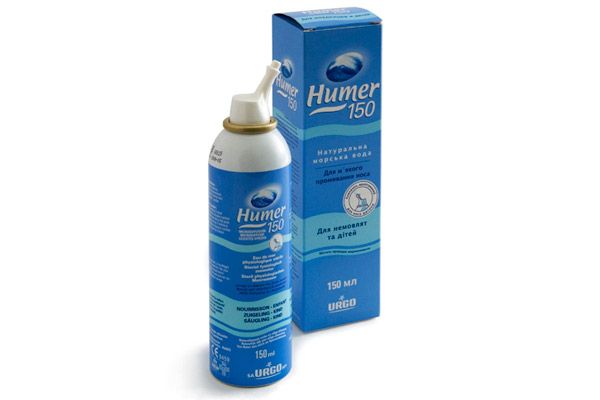
- An asterisk from the common cold is the drug Zvezdochka Noz Spray, based on xylometazoline. The spray has a vasoconstrictive effect and has almost nothing in common with all known balm "Golden Star". Asterisk Noz spray is used as much as three times a day, no longer than 3 days.
- Tysin is a vasoconstrictor spray with xylometazoline. Recommended use of Tizin - up to 3 times a day for 1 injection. You can not continue treatment with this drug for more than 3-4 days.
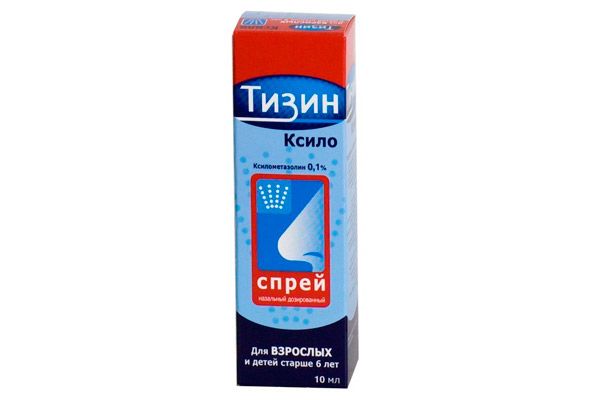
- Ximelin - a spray of vasoconstrictive action with xylometazoline. To avoid the effect of addiction, the spray is used no more than 2-3 times a day, for 4 days.
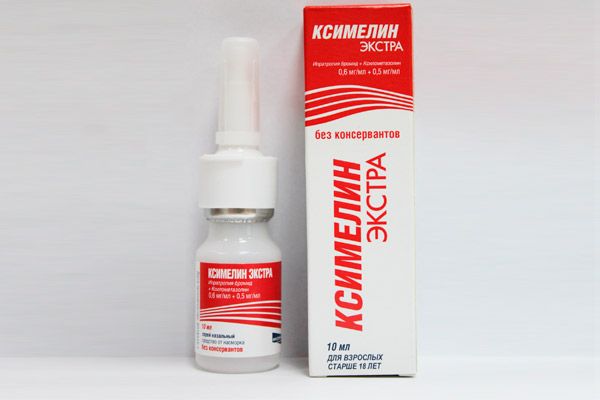
- Avamis is a hormone spray for the nose, designed to treat an allergic rhinitis. Can be used from 2 years of age for 1-2 injections once a day.
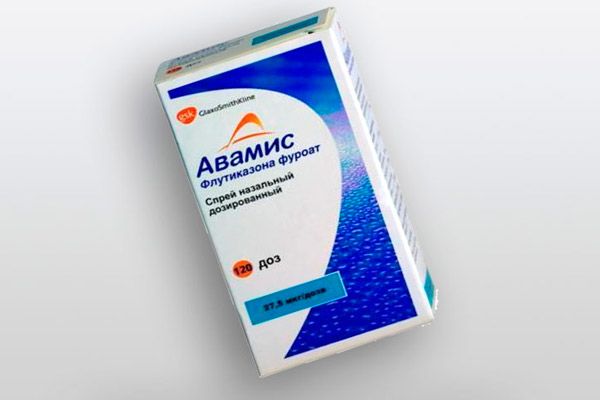
- Snoop - spray for the nose with xylometazoline. Refers to vasoconstrictor medications, therefore it is used up to 3 times a day and not more than 3-4 consecutive days.
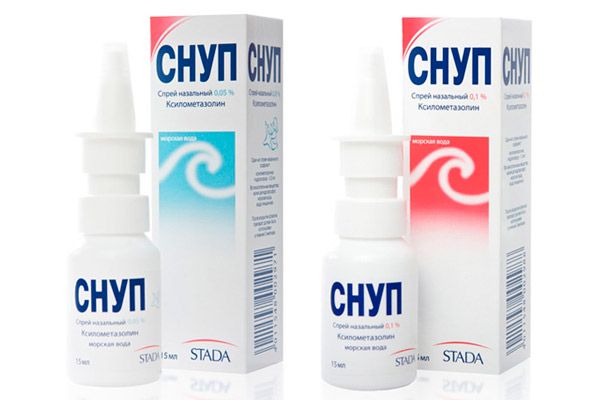
- Otryvin is an aerosol from a cold with xylometazoline. It is prescribed up to 3-4 times a day, not longer than a week. Perhaps the development of drug dependence.
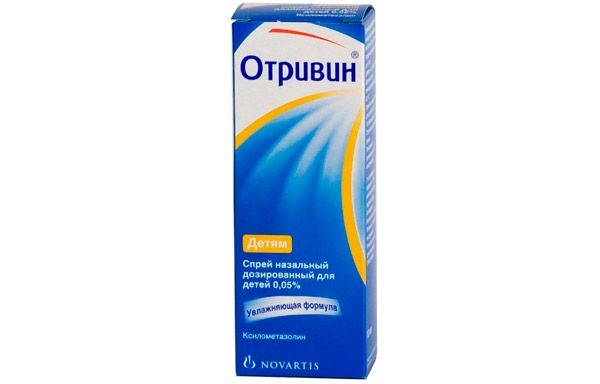
- Rinoflumucil is a combined preparation, a spray for the nose. It is a combination of mucolytic and vasoconstrictor, which generally provides a thinning of the viscous secretion with a reduction in edema and redness of the mucosa. The spray can be injected thrice a day, not more than a week.
- Nasivin - a spray for the nose of vasoconstrictive action. The active ingredient is represented by oxymetazoline. The drug is not suitable for prolonged use. Scheme of use - up to 3 times a day, up to 3-4 consecutive days.
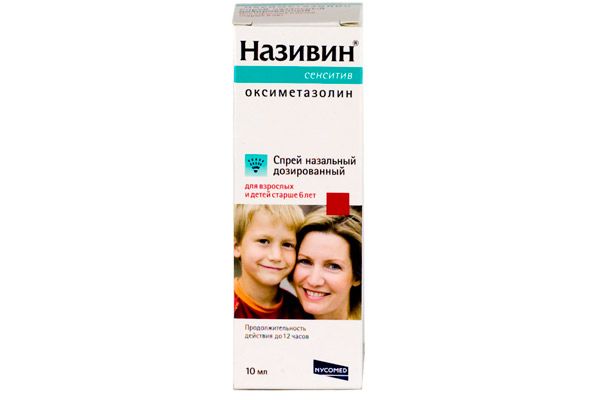
- The nose spray Wicks (Vix Active Synex Spray) is a vasoconstrictive agent with oxymetazoline. The effect of the drug lasts up to 8-10 hours. The spray from the common cold is used 2-3 times a day, up to 5 days.
- Chinese spray from the common cold Bee Gun - a spray for the nose with propolis. It is a combination of antiseptic and biostimulating substances of plant origin. It is applied up to 3 times a day, possibly long-term use of the drug. Caution: spray may cause an allergic reaction.
- Quicks Eucalyptus - a spray from the common cold with eucalyptus and sea water. It alleviates nasal breathing due to the creation of osmotic pressure in the nasal cavity. It is applied 2-3 times a day. The duration of treatment is determined by the doctor.
- Pinosol - a spray with a composition of plant origin. Has antimicrobial and anti-inflammatory action. The ingredients of the spray are oil extracts of mint leaves, pine and eucalyptus. In addition, there are thymol and tocopherol. Pinosol is allowed to use up to 6 times a day, the duration of the treatment course is 10 days.
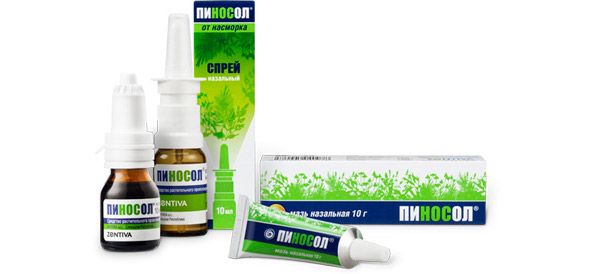
- Spray Ferveks - spraying agent from the common cold with oxymetazoline. Usually, two injections are carried out every 11 hours. The duration of therapy is 3 days.
- Tonic - spray with vasoconstrictive effect, is represented by the active component xylometazoline. The spray for the nose is injected once every 8-10 hours.
- Nazonex - a hormonal spray for the nose from the allergic form of the common cold. The active ingredient is mometasone (corticosteroid). The drug is used for prevention or treatment, 1-2 injections once a day. Duration of treatment is individual.
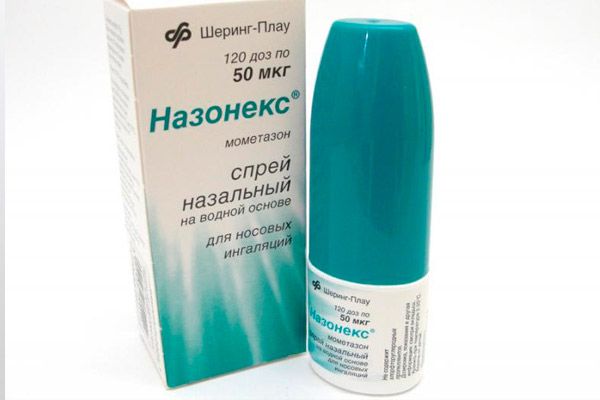
- Cameton is a combined antimicrobial and anti-inflammatory drug, the composition of which is represented by camphor, levomenthol, chlorobutanol and eucalyptus oil extract. Spray can be used up to 4 times a day.
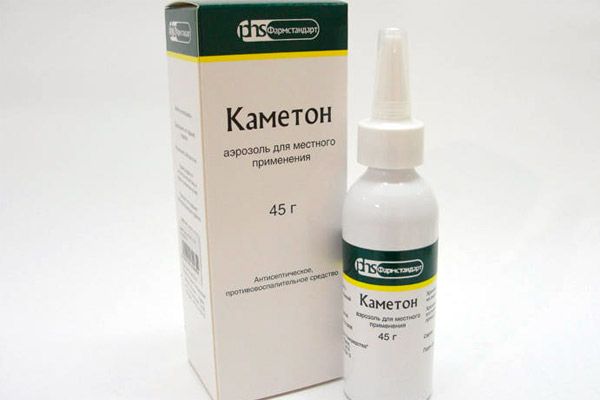
- Isophra - a spray for a nose with an antibiotic on the basis of Framicetinum. Can be used to treat the common cold and inflammation of the paranasal sinuses. The course of Isophra therapy lasts 1 week. The frequency of use is 1 injection 3-4 times a day.
- Afrin - a spray for the nose with oxymetazoline - a substance of vasoconstrictive action. Reduces the manifestation of edema and hypersecretion of the mucosa. It is recommended to inject the product once every 11 hours.
- Rhinostop - a spray that exhibits vasoconstrictive activity due to xylometazoline. It is recommended to carry out 2 injections daily for no more than 5 days.
- Rinonorm - spray with adrenomimetic xylometazoline. It facilitates breathing with the nose, eliminates excess secretion. It is used 2-3 times a day, not more than a week.
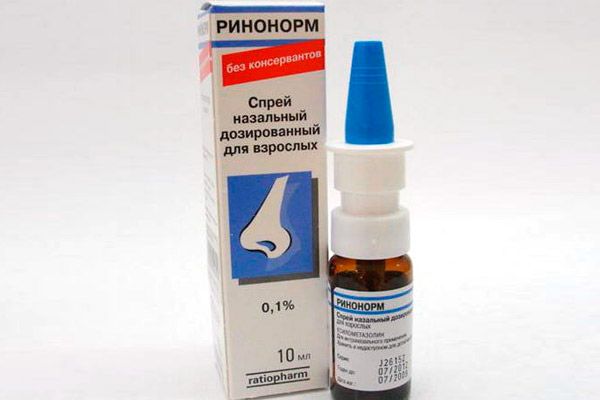
- Vibrocil is a vasoconstrictive spray for the nose from the common cold with phenylephrine and dimethindene maleate. It is used for symptomatic therapy three times a day, maximum - within a week.
- Polidexa is a combination of a combination of an antibiotic (neomycin), a glucocorticosteroid hormone (dexamethasone) and a vasoconstrictor (phenylephrine). Due to the complex effects, the spray can be used to treat acute and chronic forms of the common cold and sinusitis. The agent is injected into the nasal passages on average 4 times a day, for a week.
- Rint nasal is a spray from a common cold with menthol and a vasoconstrictor component of oxymetazoline. It is prescribed for use not more than 3 times a day, not more than 5-7 days in a row.
- Aqua Maris Strong - a spray from the common cold without xylometazoline, based on sea water. Reduces the manifestation of swelling of the mucosa, removes excessive secretion, reduces the concentration of bacteria in the nasal cavity. Spray is allowed for use by children and pregnant patients. Dosage - 3-4 injections per day, for 2 weeks.
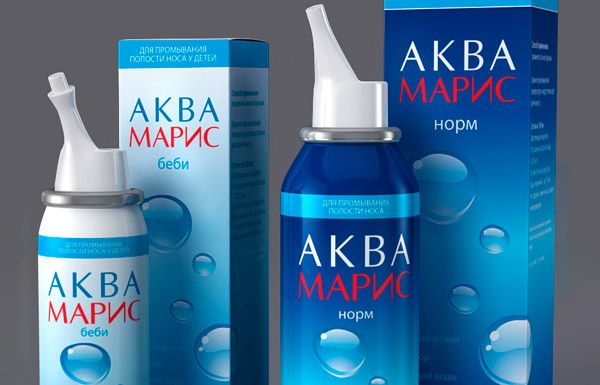
- Allertec and Nazarel are hormonal nasal sprays based on dexamethasone. Are prescribed to treat allergic rhinitis. The effect is observed already in 3-5 hours after the first injection and continues throughout the day. Sprays are applied once a day (in the morning), until complete relief of painful symptoms.
- Nasol - a spray for the nose, narrowing the vessels due to the presence of oxymetazoline. It is used for symptomatic relief of the condition in the common cold. Do not use the drug more than 2 times a day, more than 3 consecutive days.
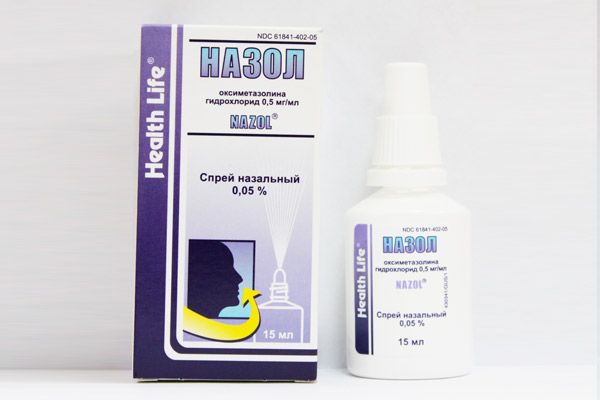
- Bioparox is a spray from the common cold with an antibiotic called fusafungin. It is prescribed for a runny nose for 4 applications per day. According to the latest data, in some countries it was banned for use due to an increased risk of allergy and anaphylactic shock.
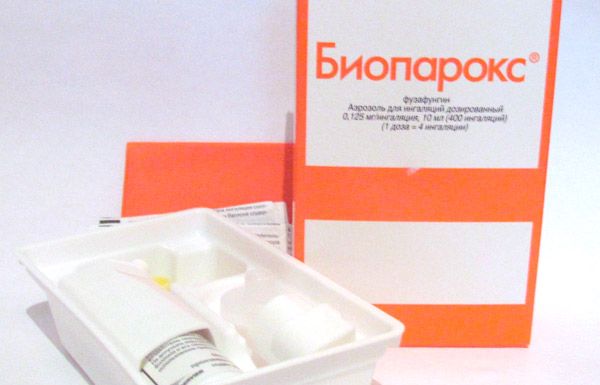
- The kingdom of fragrances is a Crimean balm for the nose from the cold on the basis of natural oil extracts. The drug creates a protective film on the mucosa, restores the surface tissue, strengthens local immunity and normalizes respiratory function. The drug is used up to 4 times a day, both with bacterial and viral rhinitis.
- Euphorbium is a homeopathic spray from the common cold with plant components. The product perfectly moistens the nasal mucosa, eliminating inflammatory changes without drying the tissues. With proper application of the drug, the common cold passes for 3-4 days.
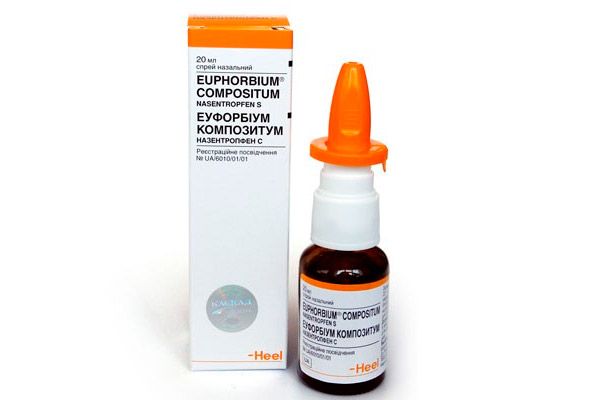
Spray can be prescribed during pregnancy and breastfeeding. Scheme of application - 1 injection up to 5 times a day.

Pharmacodynamics
If you try to systematize the list of known nasal sprays from the common cold according to their pharmacodynamics, you can draw up the following scheme:
- Sprays with alpha-adrenomimetics are vasoconstrictive drugs that reduce the secretion of the nasal mucosa and facilitate breathing.
- Sprays-antiseptics are drugs that fight infection, both bacterial and viral.
- Sprays with antibiotics are drugs that are prescribed against a particular bacterial pathogen.
- Sprays with glucocorticoids are hormonal agents that can be used for almost any type of common cold, including allergic ones.
- Sprays with immunostimulating properties - contain substances that help with inflammatory process in the nasal cavity increase local immunity.
- Plant-based sprays are complex preparations, usually with a minimum of side effects.
- Antihistamine sprays for the nose - are used for allergic rhinitis and sinusitis.
- Homeopathic sprays are preparations with a special dosage composition and with a minimum of adverse events and contraindications.
Knowing the pharmacological properties of a particular drug allows the doctor to choose the right and effective spray for a particular kind of runny nose.
Pharmacokinetics
As a rule, the use of a spray is practically not accompanied by the absorption of active substances of the drug into the blood. If some absorption occurs, then its indicators are considered clinically insignificant, since they can not affect any processes in the body.
The spray is evenly distributed on the mucosa of the nasal cavity and is removed from the nose with secretions secreted.
Accumulation of the drug in the tissues does not occur.
Dosing and administration
The use of the spray should be accompanied by the following actions on the part of the patient:
- Before the injection, it is necessary to blow your nose - to clean the nasal passages for better application of the drug;
- with one finger nuzzling a hole, inject the drug into the free nasal passage, making a sharp but shallow breath; the same is repeated with the second nostril opening;
- immediately after injection, it is undesirable to sneeze or re-clean the nasal passages so that the drug is on the mucosa as long as possible.
The dosage of the spray - the number of injections and their frequency - depends on the specific preparation and is detailed in the annotation to the drug.
Use of the a spray from a cold during pregnancy
Spray from the common cold is an undesirable drug during pregnancy. Despite the fact that its systemic absorption is minimal, such preparations are highly undesirable, since their effect has not been studied sufficiently. This especially applies to the first half of pregnancy, when the risk of fetal damage is particularly high. In extreme cases, the doctor may allow the short-term use of children's vasoconstrictor drugs. However, such an appointment is, rather, an exception to the rules, therefore, it is by no means possible to decide independently on the use of this or that remedy for a cold.
Spray from the common cold with lactation is also undesirable, because the minimum amount of the drug that still gets into the blood, also penetrates into breast milk. In the future, it may have a toxic or other undesirable effect on the still imperfect children's body.
Contraindications
Nasal sprays from the common cold are not prescribed to patients who are allergic to the ingredients of the drug.
Contraindications are also diseases of the cardiovascular system:
- heart failure;
- hypertension;
- IHD;
- disturbances of a warm rhythm.
Do not use sprays to treat the common cold in patients with diabetes mellitus, thyroid disease.
Separately, we should highlight the fact that nasal sprays are not used to treat infants. The fact that the response of a small organism to the action of the spray can become bronchospasm, therefore this form of the drug can be used only in children older than 1 year.
Side effects of the a spray from a cold
Local application of nasal sprays can cause the development of an allergic reaction to the ingredients of the medication.
Dependence on colds can develop with the use of vasoconstrictor drugs for a long time, so sprays based on alpha-adrenomimetics are not recommended for more than 3 consecutive days. This dependence is also called "addictive", and represents the difficulty of nasal breathing without a regular dose of the drug, even when the rhinitis as such has already been cured. To get rid of the dependence should immediately stop the use of vasoconstrictive spray and regularly perform procedures for washing the nasal cavity with sea water or saline (isotonic sodium chloride solution), until the nasal mucosa is completely restored.
Interactions with other drugs
Do not use several nasal sprays at the same time, and also combine the treatment with vasoconstrictive spray and vasoconstrictive drops.
When using nasal sprays with antibiotics, it is not advisable to drink alcohol during treatment.
The simultaneous use of antibiotics in the form of a spray and in the form of tablets or injections should be approved by the treating doctor.
 [21]
[21]
Storage conditions
Nasal sprays from the common cold should be kept out of the reach of children, with a temperature range of + 15 to + 25 ° C.
 [22]
[22]
Shelf life
The shelf life of the sprays can be different, usually from 2 to 3 years.

Effective spray from the cold
Is it possible to designate one of the most effective nasal spray against the common cold? The fact is that not all patients expect the same effect from sprays:
- If you need a quick effect to restore nasal breathing, nasal sprays with adrenomimetics, which have a fast vasoconstrictive effect, can help. Many of these drugs act almost instantly after the injection. The only but notable minus: vasoconstrictive sprays can not be used often or for a long time, since it is possible to develop the "addictive" effect. Adrenomimetics include all agents containing xylometazoline, oxymetazoline, or phenylephrine.
- If you need to get rid of an allergic rhinitis, then antihistamine sprays based on hormones - corticosteroids, or containing cromoglycic acid - will come to the rescue. The effect of hormonal agents is more rapid, since the effect is detected already during the first day after the application of the spray. Preparations-cromoglykates (Kromogeksal, Kromoglin, Stadaglycin) act slowly, gradually accumulating in the body. Their effect is manifested only after 1-2 weeks.
- If the purpose of spray application for the nose is not only and not so much relief of nasal breathing, as treatment of a bacterial cold or even sinusitis, here drugs of priority will be sprays based on antibiotics. Such funds are prescribed only by a doctor, taking into account the sensitivity of bacteria to antimicrobial substances.
- If you are looking for a safe and at the same time effective spray from the common cold, the action of which - if not instantaneous, but stable, then the means of choice will be the means based on sea water. They are also called simply salt solutions. Such sprays do not have a negative effect on the mucous membrane, do not cause addiction, are not contraindicated to children and pregnant patients. Within two or three days of using such a remedy, the discharge will become more fluid, breathing easier, and there will be no dryness and irritation of the mucous tissues. If saline solutions are applied directly at the first signs of acute respiratory viral infection or influenza, it is possible to prevent further spread of viruses to the lower respiratory system.
- For adherents of organic products, homoeopathic sprays on a natural plant basis are most appropriate. To treat with such means it is possible both children, and adults. Despite the fact that many people are skeptical about homeopathy, there are strong enough data on the effectiveness of such drugs from the common cold.
 [23]
[23]
Cheap spray from the cold
And, at the end of the article, we bring to your attention a short list of the most inexpensive sprays for the nose. As practice shows, many patients tend to buy just such cheap drugs. Does the quality depend on the price of the spray? Not always. Often a consumer pays extra money for a "brand", "advertising", or simply for a beautiful and bright packaging.
- Rhinolor spray, with aloe or eucalyptus. The average cost is 35-40 UAH.
- Nasol spray with oxymetazoline, the average cost - from 35 to 39 UAH.
- Nazalong spray. The price is from 30 to 35 UAH.
- Knoxprey or Noxpray the baby. The price is from 30 to 40 UAH.
- Rinoflju spray - from 22 to 25 UAH.
- Pharmazoline spray 0.1% - cost about 25 UAH.
What kind of spray for the nose from the common cold to choose - you decide. But remember that a doctor's consultation must be mandatory at the same time.
Attention!
To simplify the perception of information, this instruction for use of the drug "Sprays for the nose from the cold" translated and presented in a special form on the basis of the official instructions for medical use of the drug. Before use read the annotation that came directly to medicines.
Description provided for informational purposes and is not a guide to self-healing. The need for this drug, the purpose of the treatment regimen, methods and dose of the drug is determined solely by the attending physician. Self-medication is dangerous for your health.

